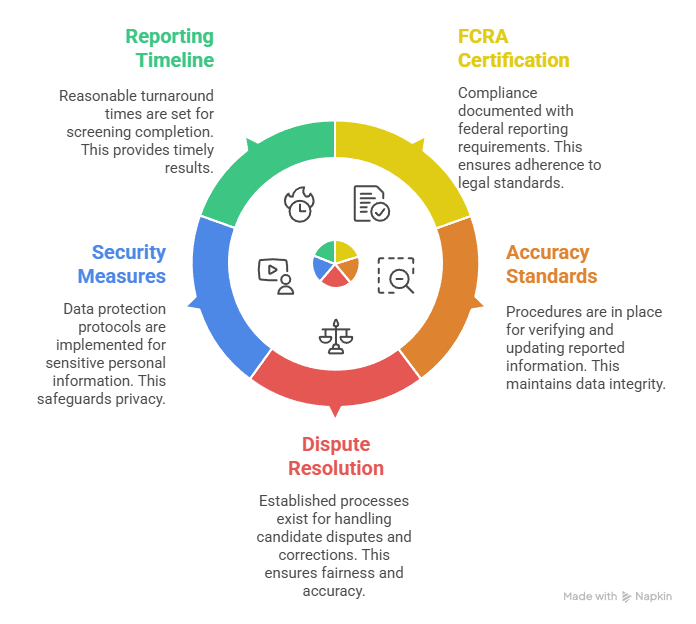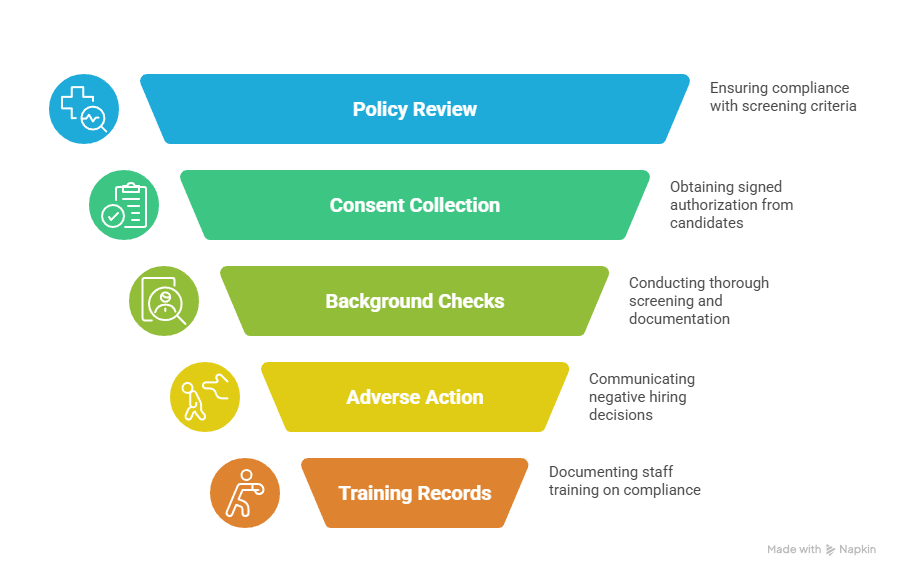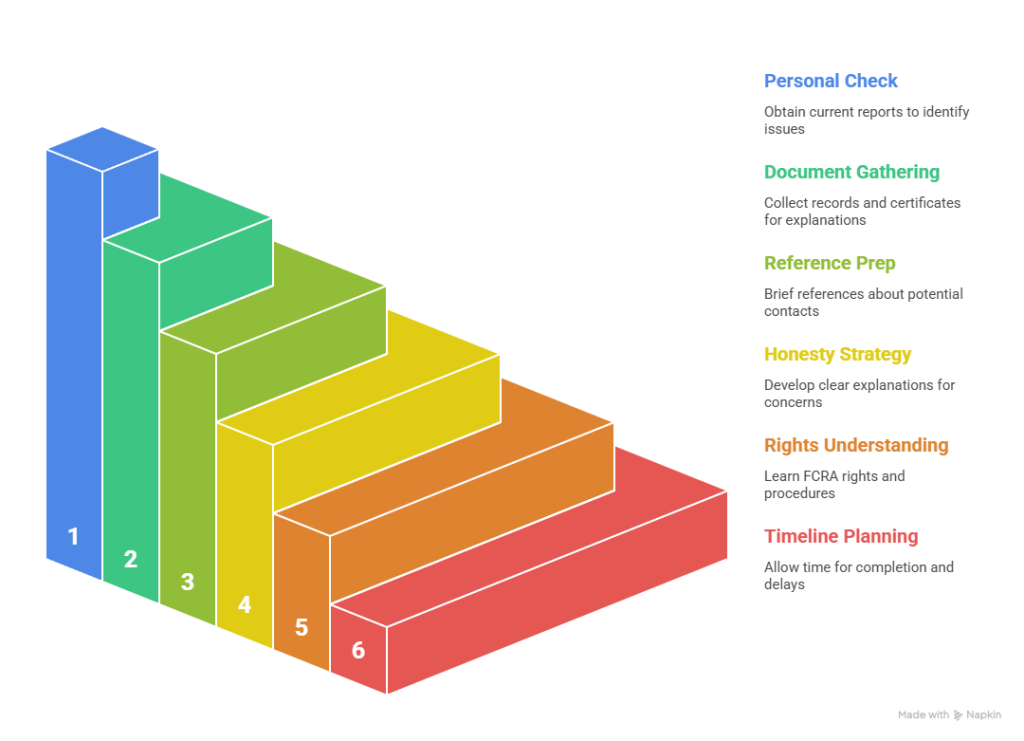Commercial cleaning companies must navigate complex federal and state background check requirements while maintaining FCRA compliance to protect their business from liability and ensure quality service delivery. Understanding these legal obligations is essential for both job seekers entering the industry and employers building compliant hiring processes.
Key Takeaways
- Commercial cleaning background checks typically include criminal history, employment verification, and reference checks as standard industry requirements.
- FCRA compliance requires proper disclosure, written consent, and adverse action procedures when conducting employment screening for cleaning positions.
- State and local laws may impose additional restrictions on background check practices, with some jurisdictions limiting how far back employers can look into criminal history.
- Different cleaning environments (healthcare, schools, financial institutions) often require enhanced background screening due to regulatory requirements.
- Job seekers should understand their rights during the background check process and know how to address potential issues before they impact employment opportunities.
- Employers face significant legal and financial liability for non-compliant background screening practices, making proper procedures essential for business protection.
Understanding Commercial Cleaning Background Check Fundamentals
The commercial cleaning industry operates under stringent background check requirements that vary significantly based on work environment, client demands, and regulatory oversight. Most cleaning companies conduct comprehensive employment screening to protect their reputation, meet client expectations, and comply with legal obligations. These requirements have evolved substantially over the past decade as businesses recognize the importance of thorough vetting processes.
Federal regulations establish baseline requirements through the Fair Credit Reporting Act (FCRA), which governs how employers can collect and use background information for hiring decisions. However, state and local jurisdictions often impose additional restrictions that cleaning companies must navigate carefully. The complexity increases when cleaning services work in regulated environments like healthcare facilities, schools, or government buildings.
Understanding these requirements helps job seekers prepare for the application process while enabling employers to build compliant screening programs. The stakes are particularly high in commercial cleaning, where employees often work unsupervised in sensitive environments with access to confidential information, valuable assets, and vulnerable populations. Additionally, cleaning staff frequently have access to secure areas during off-hours when other employees are not present.
Core Components of Cleaning Industry Background Screening
Standard commercial cleaning background checks encompass several key elements designed to assess candidate suitability and risk factors. Criminal history verification typically covers seven to ten years of records, though some positions may require more extensive searches. Employment verification confirms work history, job performance, and reasons for leaving previous positions.
| Screening Component | Typical Scope |
| Criminal History | 7-10 years, all jurisdictions |
| Employment Verification | Last 3-5 employers |
| Reference Checks | Professional and personal references |
| Identity Verification | Social Security number validation |
| Drug Testing | Pre-employment and random testing |
Reference checks provide insights into work ethic, reliability, and interpersonal skills that are crucial for cleaning positions requiring independent work and client interaction. These comprehensive screenings help employers make informed hiring decisions while protecting their business interests.
Industry-Specific Screening Variations
Different sectors within commercial cleaning require varying levels of background screening intensity based on client requirements and regulatory demands. Healthcare facilities typically mandate the most comprehensive screening due to patient safety concerns and regulatory compliance needs. Financial institutions also require enhanced screening procedures because cleaning staff have access to sensitive financial information and secure areas.
Educational facilities present unique challenges since cleaning staff work around students and may access personal information. Government contracts often require security clearances or specialized background investigations that go beyond standard commercial screening. Retail and office cleaning positions generally follow standard industry practices unless specific client requirements dictate additional screening measures.
Federal FCRA Compliance Requirements for Cleaning Companies
The Fair Credit Reporting Act establishes mandatory procedures that all cleaning companies must follow when conducting background checks for employment purposes. FCRA compliance begins with proper disclosure and written consent before any screening activities commence. Employers must provide candidates with a clear, standalone disclosure document explaining their intention to obtain background information for hiring decisions.
Written authorization from job applicants is required before initiating any background check activities, and this consent must be obtained separately from other employment documents. The law also mandates specific procedures when employers plan to take adverse action based on background check results, including pre-adverse action notices and final adverse action letters with required disclosures. Furthermore, employers must use FCRA-compliant background screening providers and maintain detailed documentation of their compliance efforts.
Cleaning companies must work with FCRA-compliant background screening providers and maintain detailed documentation of their compliance efforts. Violations can result in significant financial penalties, class-action lawsuits, and regulatory sanctions that can devastate small cleaning businesses. Moreover, individual violations can result in damages ranging from $100 to $1,000 per violation, with potential punitive damages in cases of willful non-compliance.
Adverse Action Procedures in Employment Screening
When background check results may lead to employment rejection, FCRA requires a specific adverse action process designed to protect candidate rights. Employers must provide pre-adverse action notices that include copies of the background report and a summary of consumer rights under FCRA. Candidates then receive reasonable time to dispute inaccurate information before final decisions are made.
The final adverse action notice must include specific elements and be delivered within a reasonable timeframe after the employment decision. This process protects candidates from inaccurate information while ensuring employers have followed proper legal procedures. Non-compliance with adverse action requirements represents one of the most common FCRA violations in employment screening.
Consumer Reporting Agency Requirements
Cleaning companies must carefully select consumer reporting agencies (CRAs) that maintain FCRA compliance and provide accurate, up-to-date information. The chosen CRA must follow reasonable procedures to ensure maximum possible accuracy of reported information. Additionally, they must maintain proper security measures to protect sensitive personal information during the screening process.
Key CRA Selection Criteria:

- FCRA Certification: Documented compliance with federal reporting requirements
- Accuracy Standards: Procedures for verifying and updating reported information
- Dispute Resolution: Established processes for handling candidate disputes and corrections
- Security Measures: Data protection protocols for sensitive personal information
- Reporting Timeline: Reasonable turnaround times for screening completion
Working with non-compliant CRAs can expose cleaning companies to liability even when they follow proper procedures themselves. Therefore, due diligence in CRA selection represents a critical compliance component.
State and Local Background Check Regulations
State and local jurisdictions have increasingly enacted laws that impose additional restrictions on employment background screening beyond federal FCRA requirements. These regulations often focus on limiting how employers can use criminal history information, establishing "ban the box" provisions, and protecting candidate rights during the screening process. Commercial cleaning companies must understand and comply with regulations in every jurisdiction where they operate or hire employees.
Some states prohibit employers from asking about criminal history on initial job applications, requiring them to wait until later in the hiring process before conducting background checks. Others limit how far back employers can look into criminal records or restrict the types of offenses that can be considered for employment decisions. California, New York, and several other states have comprehensive fair hiring laws that significantly impact commercial cleaning employment screening.
Key State Regulation Areas:
- Ban the Box Laws: Restrictions on criminal history inquiries during initial application phases
- Lookback Limitations: Time restrictions on how far back criminal history searches can extend
- Offense Restrictions: Limitations on which types of criminal records can influence hiring decisions
- Salary History Bans: Prohibitions on asking about previous compensation during hiring process
- Individualized Assessment Requirements: Mandated consideration of job relevance and rehabilitation evidence
Local ordinances in major cities often add another layer of complexity, particularly in markets where commercial cleaning companies frequently operate. Staying compliant requires ongoing monitoring of regulatory changes and consultation with legal professionals who understand employment screening laws. Additionally, some municipalities have their own licensing requirements for commercial cleaning businesses that include background check obligations.
Multi-State Compliance Challenges
Cleaning companies operating across state lines face particular challenges in maintaining compliance with varying state and local regulations. Each jurisdiction may have different requirements for disclosure timing, consent procedures, and adverse action processes. Some states require additional waiting periods between background check completion and hiring decisions to allow candidates time to address potential issues.
Interstate operations require comprehensive compliance programs that account for the most restrictive requirements in each operating jurisdiction. This often means implementing procedures that exceed minimum federal requirements to ensure compliance across all locations. Regular legal review and updates to company policies help maintain compliance as regulations continue evolving.
Industry-Specific Regulatory Requirements
Certain commercial cleaning environments trigger additional regulatory requirements that go beyond standard background check procedures. Healthcare facilities, schools, financial institutions, and government buildings often mandate enhanced screening protocols due to federal and state regulations governing these industries. These requirements can include specialized database searches, professional license verification, and ongoing monitoring of employee backgrounds.
Healthcare cleaning positions may require checks against exclusion databases, professional sanctions, and abuse registries to ensure compliance with Medicare and Medicaid requirements. Educational facility cleaning often involves child abuse clearances and specific criminal background restrictions related to student safety. Government facility cleaning may require security clearances or citizenship verification depending on the contract requirements.
Risk Assessment and Legal Liability Protection
Commercial cleaning companies face significant legal and financial risks when background check programs fail to meet compliance requirements or adequately assess candidate suitability. Negligent hiring claims can arise when employers fail to conduct reasonable background screening and subsequently hire individuals who cause harm to clients, coworkers, or the general public. These lawsuits often result in substantial damage awards and can threaten business viability.
Proper background screening serves as a critical risk management tool that demonstrates reasonable care in hiring decisions while protecting company assets and reputation. However, screening programs must balance thorough vetting with legal compliance and fair hiring practices. Overly restrictive policies can lead to discrimination claims, while insufficient screening may result in negligent hiring liability.
Cleaning companies also face reputational risks when employees commit crimes or engage in inappropriate behavior on client premises. News of such incidents can spread quickly through social media and industry networks, potentially damaging long-term business relationships. Therefore, comprehensive background screening represents both legal protection and business necessity in the commercial cleaning industry.
Documentation and Record-Keeping Requirements
Maintaining comprehensive documentation of background check procedures and decisions provides essential protection against legal challenges and regulatory investigations. Cleaning companies should document their screening criteria, application of those standards, and rationale for hiring decisions. This documentation demonstrates consistent application of policies and good faith compliance efforts.
Essential Documentation Elements:

- Written Policies: Clear screening criteria and procedures for all positions
- Consent Forms: Signed authorization documents from all candidates
- Screening Reports: Complete background check results and supporting documentation
- Adverse Action Records: All communications related to negative hiring decisions
- Training Records: Documentation of staff training on compliance procedures
Records should include background check authorizations, screening reports, adverse action communications, and any candidate disputes or corrections. Most jurisdictions require retention of these records for specific periods, often three to seven years after the employment decision. Proper organization and secure storage of these records facilitate compliance audits and legal defense if needed.
Insurance and Liability Considerations
Professional liability insurance may provide some protection against claims related to background screening practices, but coverage varies significantly between policies. Many standard business insurance policies exclude coverage for employment practices violations, requiring separate employment practices liability insurance. However, even comprehensive insurance coverage may not protect against willful FCRA violations or discriminatory practices.
Self-insuring against background screening risks through proper compliance programs often provides better protection than relying solely on insurance coverage. This approach involves investing in legal consultation, compliance training, and proper documentation procedures to prevent violations from occurring. Additionally, working with reputable consumer reporting agencies and maintaining current knowledge of regulatory changes helps minimize liability exposure.
Best Practices for Job Seekers in Background Check Process
Job seekers entering the commercial cleaning industry should proactively prepare for background screening by understanding their rights, addressing potential issues, and maintaining transparency throughout the application process. Obtaining personal background reports before job searching allows candidates to identify and correct any inaccuracies that might impact employment opportunities. Many issues that appear disqualifying can be addressed through proper documentation and explanation.
Honesty during the application process builds trust with potential employers and demonstrates integrity that is highly valued in commercial cleaning positions. Attempting to hide background issues often causes more problems than the underlying concerns, especially when employers discover discrepancies during screening. Most cleaning companies are willing to consider candidates with minor criminal history when approached with transparency and evidence of rehabilitation.
Candidate Preparation Steps:

- Personal Background Check: Obtaining current reports to identify potential issues and inaccuracies
- Document Gathering: Collecting court records, certificates, and rehabilitation evidence for explanations
- Reference Preparation: Briefing professional references about potential employer contacts and expectations
- Honesty Strategy: Developing clear, concise explanations for any background concerns or issues
- Rights Understanding: Learning FCRA rights and adverse action procedures for protection
- Timeline Planning: Allowing adequate time for background check completion and potential delays
Understanding the screening timeline helps candidates plan their job search effectively, as background checks can take several days to several weeks depending on the scope and complexity. Maintaining organized records and prompt response to employer requests demonstrates professionalism and reliability that employers value highly.
Addressing Common Background Check Concerns
Many job seekers worry that minor criminal history or employment gaps will automatically disqualify them from commercial cleaning positions. However, most employers in the industry understand that everyone deserves second chances and focus more on recent behavior, job relevance, and rehabilitation efforts. The key is presenting background concerns in context with evidence of positive change and growth.
Common concerns include minor traffic violations, old misdemeanor convictions, employment terminations, or gaps in work history due to personal circumstances. Preparing brief, honest explanations that focus on lessons learned and positive changes can help employers understand these issues in proper perspective. Additionally, obtaining character references from community leaders, counselors, or previous employers can provide valuable context for background concerns.
Understanding Your Rights During Screening
Job candidates have specific rights under FCRA and state laws that protect them during the background screening process. These rights include proper notification of screening intent, written consent requirements, and access to background reports used for employment decisions. Candidates also have the right to dispute inaccurate information and receive reasonable time to address potential issues.
When employers take adverse action based on background check results, candidates must receive proper notice and explanation of the decision. This includes information about the consumer reporting agency used, the right to obtain additional free copies of the background report, and procedures for disputing inaccurate information. Understanding these rights helps candidates navigate the screening process effectively and address any problems that may arise.
Conclusion
Commercial cleaning background check requirements represent a complex intersection of federal regulations, state laws, industry standards, and business risk management needs. Success in navigating this landscape requires understanding FCRA compliance obligations, staying current with evolving state and local regulations, and implementing screening programs that protect business interests while respecting candidate rights. Job seekers benefit from proactive preparation and transparency throughout the screening process, while employers must balance thorough vetting with legal compliance and fair hiring practices. As regulations continue evolving and industry standards become more sophisticated, both parties must remain adaptable and informed to ensure successful employment relationships in the commercial cleaning industry.
Frequently Asked Questions
How long do commercial cleaning background checks typically take to complete?
Commercial cleaning background checks usually take 3-7 business days for standard screening, though complex cases involving multiple jurisdictions or court record research may require 2-3 weeks. Factors affecting timeline include the scope of screening, candidate responsiveness, and court system efficiency in relevant jurisdictions.
Can employers in commercial cleaning reject candidates for any type of criminal history?
No, employers must consider job relevance, time elapsed, and evidence of rehabilitation when evaluating criminal history. Many states prohibit blanket exclusions and require individualized assessments. Minor offenses unrelated to cleaning work may not justify employment rejection under current fair hiring laws.
What rights do job candidates have during the background check process?
Candidates have rights to proper disclosure, written consent requirements, dispute inaccurate information, receive copies of background reports used for employment decisions, and follow adverse action procedures under FCRA. State laws may provide additional protections and procedural requirements.
Are cleaning companies required to provide background check results to job applicants?
Under FCRA, employers must provide copies of background reports when taking adverse action based on the information. However, they're not required to share reports for candidates who are hired or rejected for other reasons, though some state laws may require broader disclosure.
How far back can commercial cleaning companies look into criminal history?
Federal law doesn't limit criminal background check timeframes, but many states restrict lookback periods to 7-10 years for most offenses. Some serious crimes may have longer or no time limitations. The specific timeframe depends on state law, job requirements, and industry regulations.
Do commercial cleaning positions require drug testing in addition to background checks?
Many commercial cleaning companies require pre-employment drug testing and may conduct random testing during employment, especially for positions in healthcare, schools, or government facilities. Drug testing requirements vary by employer policy, client demands, and applicable regulations.
Additional Resources
- Fair Credit Reporting Act (FCRA) Summary of Rights
https://www.consumer.ftc.gov/articles/pdf-0096-fair-credit-reporting-act.pdf - EEOC Guidance on Arrest and Conviction Records
https://www.eeoc.gov/laws/guidance/arrest_conviction.cfm - National Association of Professional Background Screeners
https://www.napbs.com/ - Society for Human Resource Management Background Screening Resources
https://www.shrm.org/resourcesandtools/tools-and-samples/toolkits/pages/backgroundchecks.aspx - State-by-State Background Check Laws Guide
https://www.nolo.com/legal-encyclopedia/state-laws-use-arrests-convictions-employment.html - Consumer Financial Protection Bureau FCRA Resources
https://www.consumerfinance.gov/compliance/compliance-resources/other-applicable-requirements/fair-credit-reporting-act/
